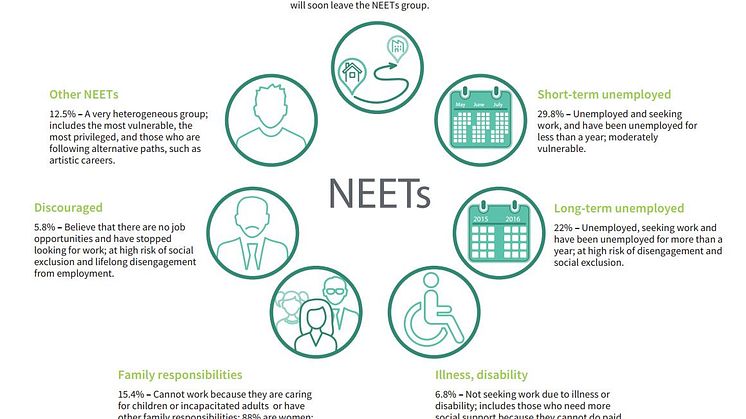
News -
The scarring effect of long-term youth unemployment
Young people are more affected than other age groups by long-term unemployment. While long-term youth unemployment is certainly not a new policy challenge for Europe, it now affects a wider range of young people than it ever did before, ranging from those with third-level degrees to the most disadvantaged young people. Eurofound's new report on long-term unemployed youth identifies the factors that increase the risk of a young person being in this situation and looks at the overall impacts on well-being and long-term employment prospects.
Although youth unemployment has been declining since 2013, it still remains high compared to other age groups. In 2016, 18.7% of young people aged 15–24 years were unemployed, as compared to 8.2% of ‘prime-age’ workers and 6.5% of older workers. The trend is similar for long-term unemployment: in 2016, 5.5% of the active population of young people aged 15–24 years were long-term unemployed in Europe, compared to 3.9% of ‘prime-age’ and older workers. This translates to almost 1.3 million young people in the EU last year who were out of work and actively seeking employment for at least 12 months.
The new study, which follows-up on previous research on young people not in employment, education or training, firmly establishes that a lack of education and work experience are the two main driving factors in increasing the likelihood of a young person becoming long-term unemployed. The report also highlights that long-term unemployment dramatically affects several dimensions of young people’s well-being; in particular, it decreases overall life satisfaction and increases the risk of social exclusion, while also decreasing optimism about the future.
When it comes to tackling long-term youth unemployment, the report stresses that effective outreach is key, and the use of alternative channels, especially online tools such as dedicated websites and social media, may be an efficient and cost-effective option in reaching marginalised young people. The report also stresses that a multidimensional policy response is needed, one that includes innovative new approaches in policy design and implementation.
A holistic, individualised and young-people-centred approach is crucial for bringing young people back on track. Such an approach includes elements such as counselling, mentoring, referral to specialised support, tailor-made training and job placements, as well as flexible and sustained support through all stages of the programme.
Read the report in full: Long-term unemployed youth: Characteristics and policy responses






